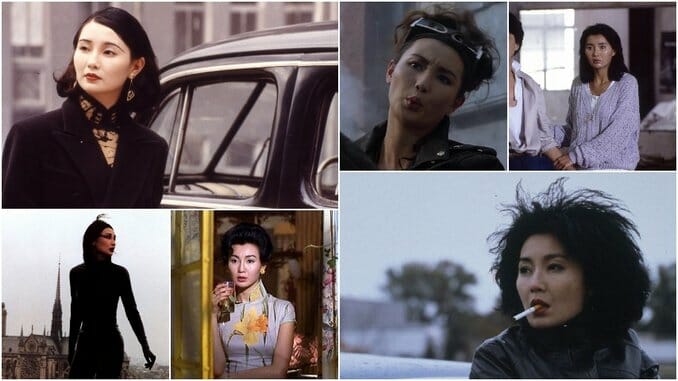Last month, the Criterion Collection released the long-awaited World of Wong Kar Wai box set, which features most of the films made by the influential Hong Kong filmmaker. And while Wong got beautiful, romantic performances out of a loyal stable of actors, from Brigitte Lin to Faye Wong to Tony Leung Chiu-wai to the late Leslie Cheung, most WKW enthusiasts know there is one actress who was perhaps his greatest muse: Maggie Cheung.
While Cheung appeared in two of Wong’s earlier films, As Tears Go By and Days of Being Wild, it was her performance in Wong’s 2000 masterpiece In the Mood for Love that made her an international treasure (and pleasure) to behold. She wrapped herself in clinging yet fierce cheongsams as a 1960s Hong Kong woman who engages in a flirtatious, platonic relationship with the man (played by Leung Chiu-wai) whose wife is having an affair with her husband. Cheung is a ravishing, repressed vision, playing a woman who continually contemplates if she should indulge in a vengeful fling with someone who turns out to be a better significant other than her actual significant other. Needless to say, Cheung got many accolades as well as awards for her performance.
But despite being one of Hong Kong’s most acclaimed actresses (she won Best Actress awards at the Hong Kong Film Awards—five times—and the Cannes Film Festival), Cheung hasn’t been seen in a movie in years. She pretty much got out of the game in the mid-aughts. (She did do a wordless cameo in Wong’s Mood follow-up 2046 in 2004.) The last thing she appeared in was Isaac Julien’s 2010 film Ten Thousand Waves as Mazu, Chinese goddess of the sea. Instead, she has devoted her time to philanthropy, making music and editing. She was also appointed as UNICEF’s Ambassador to China in 2010.
So, why would such a lauded, adored figure like Cheung retire from acting, right when it seemed like she could have become a global movie star? You would have to go back in her filmography to get some clues.
A good place to start is the movie Center Stage, which has been released in a 4K restoration by Film Movement and has been making the virtual-cinema rounds across the country. Released in 1991, Stage is a lengthy hybrid of documentary and melodrama, telling the story of Ruan Lingyu (played by Cheung), a beloved, tabloid-attracting, Shanghai silent-film star who committed suicide at age 24. In her turn as Ruan, Cheung, who won Best Actress at the 1992 Berlin International Film Festival for her performance, practically perfects her flair for resting on walls in form-fitting dresses, looking vulnerable but still seductive, an actress who almost drives herself batty proving she’s more than a pretty face. After a particularly emotional day on-set, Cheung’s Ruan tells a fellow actress, “Acting is like madness. Actors are madmen. I’m one of them.”
Of course, it’s the nonfiction bits in between the drama that give you insight as to what sort of performer the young Cheung (who was often cast as weak, clumsy women after her star-making role as Jackie Chan’s weak, clumsy girlfriend in his successful Police Story movies) wanted to be at the time. The movie starts off with director Stanley Kwan showing Cheung stills from movies Ruan appeared in, some of them from prints that are no longer in existence. When Kwan tells her how she went from doing light roles to wanting to delve into more serious material, Cheung says, “We share similar fates then?” before breaking out in laughter. When Kwan asks her how she would like to be remembered, she replies, “That’s not so important to me. But, if people do remember me, it’ll be in a different light than Ruan.”
In Center Stage, the married-but-separated Ruan was romantically entangled with a few dudes, including a married rich man and an idealistic—and married—director. Years later, Cheung herself would be briefly married to filmmaker Olivier Assayas, a relationship which likely began when they made the 1996 film Irma Vep. (Currently available to stream on the Criterion Channel and HBO Max, the movie will also be released by Criterion on Blu-ray and DVD on April 27.)
Written and directed by Assayas, Vep practically seems like the French counterpart to Tom DiCillo’s Living in Oblivion, released a year before, satirically showing the insane lengths a hectic, French film crew goes through just to make a movie. In Vep, Cheung plays herself, virtually a stranger in a strange land (not to mention rocking a British accent, reminding the audience of her British upbringing), as the lead actress in a French remake of the silent-film serial Les vampires, helmed by a rather unpredictable film director (Francois Truffaut regular Jean-Pierre Leaud), who chose her because she looked good kicking ass in an action movie.
Perhaps the most dead-on movie about filmmaking ever made, Vep also gives you an idea of why Cheung might have not wanted to do the whole international ingenue thing. While Center Stage shows how hard it can get for actresses to maintain both a personal and professional life in their Chinese homeland, Vep has Cheung being a fetishistic object of desire to foreigners. Mostly covered in a skin-tight, jet-black, latex rubber suit (snagged at a sex shop!), Cheung slyly tries to keep everyone—from the director to her leading man to the female wardrobe designer—from jumping her bones.
When you look at both those movies side-by-side, you understand why Cheung would leave acting behind in her later years. Even though her fans (myself included) miss her dearly, we’d rather have a Maggie Cheung that’s still around, living a stable, comfortable life, than another Asian screen siren who left us too damn early.
Craig D. Lindsey is a Houston-based writer. You can follow him on Twitter and Instagram at @unclecrizzle.
